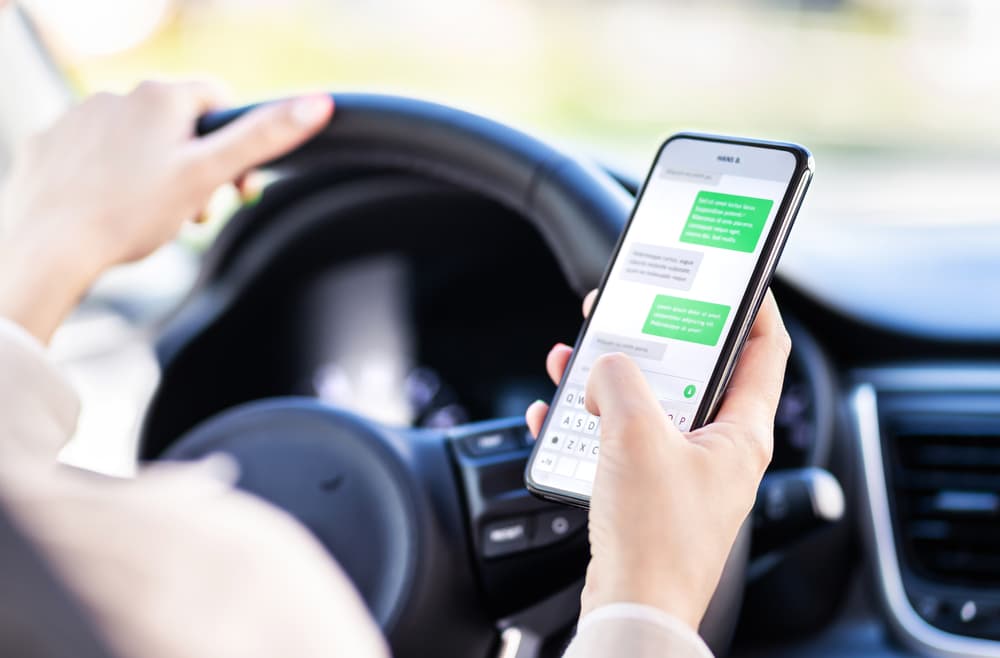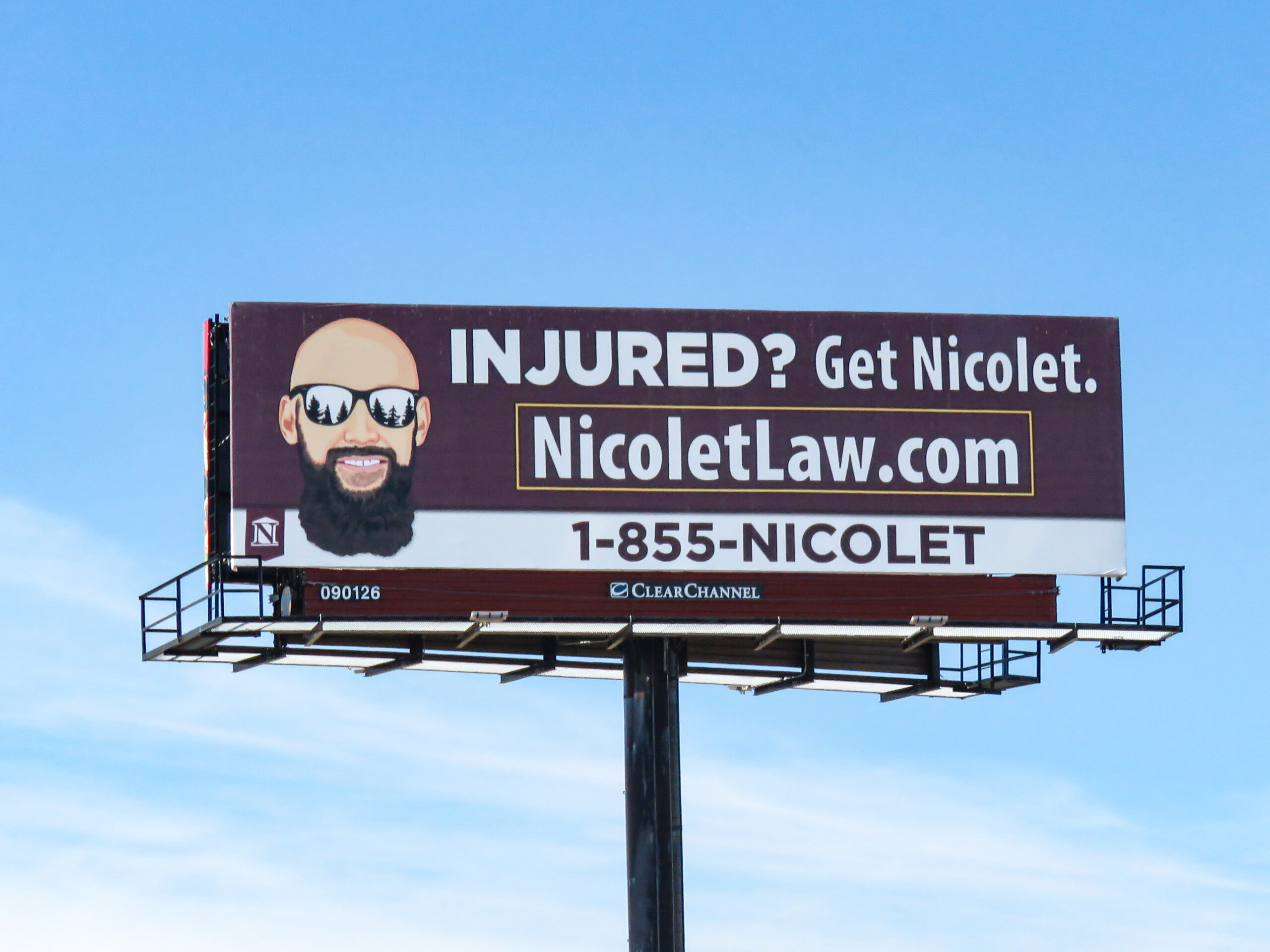If a car hits you from behind, the two most important things to do are call the police and contact a car accident attorney. These first steps ensure your safety, protect your rights, and help you seek compensation for damages or injuries.
However, you may need to take additional steps depending on where the accident occurred.
With consequences that could change your life in seconds, taking the right steps could mean the difference between a positive outcome and debilitating long-term consequences. A skilled Minnesota car accident lawyer is at your doorstep to help you for getting compensation you deserve.
What Causes Rear-End Accidents?
Distracted Driving

Distracted driving is a growing epidemic, causing severe injuries, costly property damage, and expensive medical bills.
Distracted driving includes easily identifiable distractions, such as texting or making a phone call, as well as more subtle actions, like changing the radio station or eating.
Cognitive distractions, such as daydreaming or being emotionally upset, can also be deemed distracted driving.
Because anywhere is a potential place for distracted driving, rear-end collisions can happen at intersections, in stop-and-go traffic, or even on highways.
Drunk Driving

Driving while under the influence of alcohol or drugs is a well-known and common cause of rear-end accidents.
Impaired judgment, delayed reaction times, and blurred vision all contribute to a driver's inability to stop before colliding with the vehicle in front of them.
Drunk driving accidents are especially dangerous and often result in traumatic brain injuries, spinal cord damage, and sometimes death.
Aggressive Driving

Aggressive driving takes many forms, from tailgating and excessive speeding to weaving in and out of lanes.
No matter the specific action, these behaviors don't give drivers enough time to stop, easily resulting in a rear-end collision.
When aggressive driving becomes full-on road rage, the risk of hitting a car from behind increases significantly.
With drivers intentionally trying to intimidate or harm others on the road, the victim and the aggressor risk erratic behavior, resulting in accidents.
Driver Fatigue
Driving while fatigued is a significant issue, with studies showing that it can be just as dangerous as drunk driving.
When drivers are excessively tired, their reaction times are slowed, and they may even doze off behind the wheel, accidentally hitting the car in front of them.
This is especially common for long-distance truck drivers or those who work late shifts.
If a driver falls asleep at the wheel and causes a rear-end collision, they can be held liable for any damages or injuries caused.
Common Injuries When a Car Hits You From Behind
It's easy to think of rear-end collisions as minor accidents where no one gets harmed. However the truth is that these accidents are known to cause several serious injuries.
The most notable is whiplash. The sudden jolt of impact can cause neck, back, and shoulder pain that can last weeks, months, or even years.
Moreover, the effects of whiplash may not manifest immediately after the accident, making it difficult to determine the full extent of the injury without proper medical attention.
Other common injuries from rear-end collisions include:
- Head and brain injuries
- Spinal cord injuries
- Broken bones
- Bruises and lacerations
Many people feel fine initially after a car hits them from behind. As a result, they fail to file a personal injury claim in time to receive compensation for their injuries.
This is why contacting car accident injury lawyers after a rear-end crash is vital, even if you feel fine. They can help you account for any potential long-term effects of the accident and ensure you are appropriately compensated for your injuries.
The Do's and Don'ts of Rear-End Accidents
DO schedule a free consultation with a personal injury law firm.
Even if it's just to navigate the complicated insurance process, their invaluable advice during a free consultation ensures you can focus on recovery while they work towards a full, fair settlement.
DO document everything.
Keep detailed records of everything related to the accident, from the accident scene to any medical treatment you receive. This information can be crucial in proving your case and receiving full compensation for damages and injuries.
Additionally, take photos of any visible injuries and damage to your vehicle after the accident. Police reports can take a few weeks to obtain, so it's important to have your own documentation in the meantime.
DON'T settle at the scene.
It may be tempting to exchange information and move on, especially in minor fender benders or parking lot accidents. However, it's important to remember that some injuries may not manifest immediately, and settling at the scene could prevent you from receiving proper compensation.
Always call the police when involved in a rear-end accident. Having an officer start an official report gives you a record of the incident that can be referenced later to prove your case.
DO forward all communications with insurance companies to your attorney.

Insurance companies may try to offer a quick settlement that does not fully cover your expenses. Having an experienced personal injury lawyer review and negotiate on your behalf ensures fairer compensation for all current and future damages.
Additionally, do not sign any documents or waivers from insurance companies without first consulting with your legal representative. Doing so could limit your ability to seek compensation in the future.
DON'T post about the accident on social media.

While sharing your experience on social media is tempting, any posts or comments could be used against you by insurance companies or in negotiations. It's best to only speak with your legal counsel about the case.
How Much Does a Rear-End Collision Cost?
Whether minor or severe, rear-end collisions can result in costly damages and expenses, including but not limited to:
- Property damage: The average claim in the USA is $3,000
- Whiplash treatment: $6,000 to $30,000 in upfront costs; potentially millions over a lifetime
- Surgical broken bone treatment: $25,000+ per bone
- Ambulance/paramedic care: As much as $5,000
- Emergency room visit: Averages $2,800 per visit
- Soft tissue repair: $2,000 to $50,000+
- Laceration treatment: $2.000 to 30,000+ per cut
- Traumatic brain injury: $400,000+ in upfront costs; $3+ million over a lifetime
- Emotional trauma and mental health treatment: Hourly rates can cost tens or hundreds of thousands over a lifetime
Furthermore, the financial impact is even more significant when injuries limit earning capacity or prevent a return to work.
Personal Injury Protection (PIP) often falls short compared to the current and future expenses related to rear-end car accidents. This is why working with an award-winning personal injury law firm who can help fight for your right to full and fair compensation is important.
How Long Do I Have to File a Personal Injury Claim After a Car Hits Me From Behind?
Understanding the Statute of Limitations
The statute of limitations, which determines how long it takes to file a personal injury claim after a rear-end accident, varies by state. It typically ranges from one to six years.
For example, in North Dakota, where the statute of limitations is six years, you would have up to six years from the accident date to file a personal injury claim.
In Minnesota, car accident victims are afforded the same amount of time unless a wrongful death occurs. Then, the statute of limitation decreases to three years.
In Wisconsin, you generally have three years, but that statute of limitations can decrease to two years if a death occurs in a motor vehicle accident.
Considering the grief, shock, and recovery time that often follows a rear-end car accident, even six years can go by quickly. In the meantime, injured victims are left with an ever-growing burden of financial, physical, and emotional stress.
By making a car accident lawyer one of your first priorities after a car hits you from behind, you can ensure all legal deadlines are met while you focus on healing and moving forward.
A Personal Injury Claim Timeline

Though there is no specific time between filing a personal injury claim and receiving a settlement, a few general steps typically occur:
- Consultation with personal injury law firm: This should happen immediately after the accident or as soon as you can seek legal counsel.
- Investigation and evidence gathering: Your attorney will gather all necessary information and evidence to support your case, including documentation of injuries, medical expenses, and property damage.
- Negotiation with insurance companies: Your attorney will work with insurance companies to negotiate a fair settlement that covers your expenses and damages.
- Filing a lawsuit: If necessary, your attorney may file a lawsuit against the responsible party and continue negotiating for a settlement while preparing for trial.
- Settlement or verdict: In most cases, you will settle before trial. If negotiations fail, your attorney will litigate in court on your behalf.
Considering that much of this process relies on medical records and other documentation that can take weeks or months to gather, it's important to begin as soon as possible after a rear-end accident.
Exceptions to the Rules
While general rules and timelines apply to many car accidents, some exceptions may allow for a longer or shorter filing period, including but not limited to:
- Minors: If a minor is in the accident, the statute of limitations may not begin until the minor reaches legal age.
- Discovery rules: In some states, the statute of limitations may not begin until the injury or damages are discovered, rather than at the time of the accident.
- Government entities: Car accidents with government or municipal vehicles typically have shorter filing periods. For example, some states require that you file the initial claim within 30 days and leave you with only a year to seek compensation through a personal injury claim.
- Wrongful death: If a rear-end accident resulted in the death of a loved one, different rules and timelines may apply to filing a wrongful death claim.
The complexities of rear-end car accident cases and personal injury claims make it hard for victims to understand their rights, let alone ensure fair compensation.
However, with the help of car accident attorneys, you can avoid common pitfalls that can make it difficult to recover from a car accident.
What to Do if a Car Hits You From Behind? Take Legal Action Immediately.
No matter how you slice it, rear-end accidents can result in significant physical, financial, and emotional damages.
As such, it is vital to make your first call after a rear-end collision to an accident and injury law firm who can help protect your rights and fight for the compensation you deserve.
Don't wait to seek legal counsel – contact a personal injury attorney today and start your journey towards justice.
Rear-End Car Accident FAQ
How much is my car accident claim worth?
The value of a car accident claim can vary greatly depending on the specific circumstances and damages involved. These may include medical expenses, loss of income, pain and suffering, emotional distress, and property damage.
Should I take a settlement offer from the insurance company?
Before accepting any settlement offer from an insurance company, consulting with a personal injury lawyer is essential. Insurance companies often try to settle for less than what is deserved, and a legal professional can help negotiate a fair settlement that covers all of your expenses and damages.
Do I have to testify in court for a rear-end car accident case?
If a case goes to court, your attorney will likely rely on expert testimony and evidence to prove your case. However, there may be instances where you will need to testify in court or provide a deposition. Should this happen, your legal counsel will prepare and guide you.
